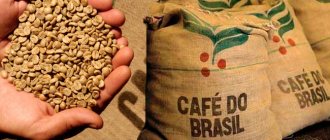Does coffee grow in Turkey?
The Republic of Turkey is not among the countries that grow coffee trees. Nevertheless, this drink (along with tea) is so popular in the country that it is considered part of the national culture, an indispensable attribute of special events, business meetings and family feasts.
Local supply companies offer a wide selection of different types of drink.
The first place is occupied by Turkish coffee beans, which are brewed in a traditional cezve with the addition of:
- cognac;
- nuts;
- spices;
- honey;
- fruit juice.
The drink first appeared in the Ottoman Empire in the 16th century.
There are different versions about this event:
- The fruits of the coffee tree were brought to Turkey by Syrian travelers.
- The drink was first served to Suleiman the Magnificent, who paid a visit to Yemen, which at that time was part of the huge Ottoman state.
In the first years after its appearance in the country, coffee was considered a privilege of the nobility. Later, the “invigorating elixir” began to spread throughout society, winning the love of the local population.
The Turkish climate is not entirely suitable for growing coffee trees. Historically, raw materials were imported from Arab countries. Now coffee beans are an important import item for the country. The Republic of Turkey has entered into agreements for the supply of raw materials with many global manufacturers.
Turkish coffee recipes
So, let's move on to practical instructions on how to brew Turkish coffee yourself without being a professional barista. Please note that regular Turkish coffee on a gas stove is not Turkish. The main feature here is the sand. In the cezve, immersed in hot sand almost to the neck, thermal processes occur that reveal the maximum facets of the drink’s taste.
Additional ingredients, proportions, and sizes of the Turka itself may be different. The main thing is to follow the technology. Let's look at several recipes for real Turkish coffee.
On a note! According to tradition, the Turkish drink is very strong and is served in small cups with a glass of plain water. After a sip of coffee, you should take a sip of water to cleanse your taste buds and make the next sip feel like a new one.
Classic recipe
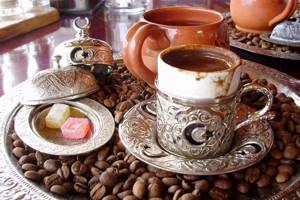
It is necessary to calculate the portions of the drink in advance and take an appropriate size Turk or several Turks if coffee is being prepared for many people at once. Instructions:
- Grind the coffee beans to make flour and prepare everything you need.
- Warm up the sand.
- Immerse the empty cezve in it and let it warm up.
- Place coffee at the bottom (at the rate of 2 tsp per serving), sugar to taste, and pour in a thin stream of water.
- Deepen the bowl into the sand and wait for the foam to begin to rise.
- As soon as you see a foamy “cap,” remove the Turk from the sand, place the foam in cups, and immerse the vessel in the sand again. Do the procedure 4-6 times.
- Then remove the Turk again, after 1 minute pour the drink into cups and serve.
According to the rules, Turkish coffee, prepared on sand, is served on large round trays.
Original recipes
Turkish coffee can be brewed with the addition of spices, milk, herbs and other ingredients that enrich the taste of the drink. We present several more recipes for different tastes.
With milk
Coffee with milk is brewed exactly as described in the classic recipe, only milk is used instead of water. If you want a rich, creamy taste, use pure milk. For those who want a lighter drink, milk should be diluted with water.
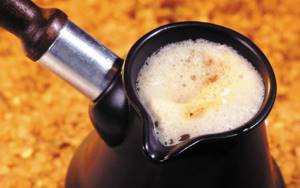
With salt
Salt can reveal even more notes in the taste of an invigorating drink. The basic recipe is also used to make coffee with salt. Salt (at the tip of the knife) is added approximately halfway through the process, when the liquid is already sufficiently hot. After the salt is thrown into the Turk, you need to stir the coffee.
With cardamom
A magnificent aromatic drink with cardamom also does not have any special nuances in cooking. All ingredients (ground grains, sugar, cardamom) are placed in a cezve, filled with water, and then everything is done according to classical technology. The amount of cardamom is chosen to taste.
With honey
Honey is a fragrant and healthy sugar substitute. Turkish coffee is prepared in the usual way, honey is added at the end when the drink is ready. If you add honey right away, the drink will retain its sweetness, but the aroma and vitamins will be lost.

Arabic recipe
Arabic coffee is made in Turk, but is somewhat different from Turkish. In the classic recipe, cardamom is always added to it. You can brew the drink on sand or on a regular stove.
How to cook:
- Heat the turk on fire/sand.
- Put sugar in it and lightly fry it until brown, stirring constantly.
- Then place the ground coffee beans and cardamom in a vessel and heat it slightly.
- Fill everything with a thin stream of clean water.
- Brew the drink until the “cap” begins to rise. Then remove the Turk from the heat, wait for the foam to settle, and put the dish back on the fire. Repeat these movements 3-5 times.
- Remove the cezve from the heat, let the drink stand for 1 minute so that the sediment sinks to the bottom, and then pour into cups.

What types of coffee are there in Turkey?
Coffee products in Turkey can be found in every supermarket. In all cities of the country there are stores specializing in the sale of this product.
The main rule for preparing real Turkish coffee is to use Arabica beans, finely ground and moderately roasted. Coffee can be bought in Turkey almost on every corner: in small shops, large supermarkets and in specialized shops. On the shelves there are options from the strongest to caffeine-free mixtures, as well as with various flavoring additives.
Turks also pay attention to other types of coffee:
- Soluble . It is represented by a variety of brands, the most popular of which are “Jacobs” and “Nescafe”. The drink made from such raw materials is not strong. Many people call it “female” or “childish”.
- Ground coffee almost ready for brewing. The grains do not need to be crushed; it is enough to prepare the drink in a traditional cezve.
- Ottoman coffee stands out in a separate group. When brewing a hot drink, milk, sugar, and aromatic spices are added.
Be sure to read: Turkish Dogus tea: what the collection consists of, beneficial properties, to whom it is indicated, types, brewing rules
How to make Turkish coffee
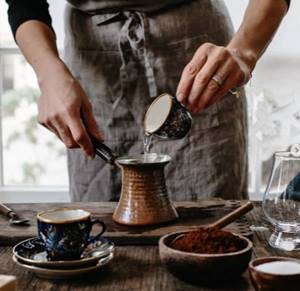
In Turkey, classic coffee is often varied with additional ingredients. Spices are used for this (cinnamon, ginger, cardamom). Nuts (walnuts, hazelnuts), pepper, even chicken egg yolk or garlic and honey are added.
Be sure to read: Bulgur: what is it, calorie content, how it differs from wheat cereal, how and how much to cook, what are the benefits
| type of additive | cooking features |
| nuts | The crushed nut kernels are fried and placed in a cezve along with the rest of the dry ingredients. If desired, additional cinnamon powder can be used. |
| spices | Cardamom, cinnamon or ground ginger will combine with the coffee. Add sugar to taste. |
| yolk | Half the yolk is whipped until foamy and transferred to a cup. Then the brewed hot drink is poured. Sugar - to taste. |
| honey and garlic | Garlic passed through a press is combined with ground grains. The drink is prepared in the usual way. Honey is added to the cup, then hot coffee is poured. |
| ground hot pepper | A few pinches are added when the liquid first boils. |
Options that involve the use of spices, garlic, honey and pepper are suitable for treating colds. A hot drink with yolk has nutritional and tonic properties.
Turkish coffee recipe with orange juice

An unusual option for brewing Turkish coffee. The liquid here is orange juice.
First, the cezve is filled with ground coffee beans. If desired, add sugar (to taste). The mixture warms up within a minute.
Dry ingredients are poured with juice. Everything is put on low heat. At the moment the liquid boils, the dishes are removed from the stove.
Turkish iced coffee
It is based on a classic cooking option. Sugar is added to freshly brewed coffee (if it was initially absent). Then comes the turn of the ice cubes.
Sometimes the finished drink is poured into special molds and frozen. At the same time, the shelf life of the product is quite long. This delicacy is called “coffee ice”. It is very refreshing on a hot summer day.
Turkish coffee with cognac
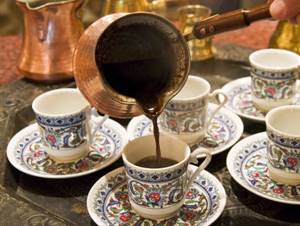
Liqueur or cognac is often used as an additional ingredient. This additive gives the drink strength and richness.
Required:
- freshly ground grains - 8 grams;
- sugar - 3-4 tsp;
- water - 100 ml;
- cognac (liqueur) - 20-25 ml.
Be sure to read: Turkish sweets
Cooking process.
- Coffee is brewed according to the classic recipe, immediately with sugar.
- The finished drink is removed from the heat.
- Cognac or liqueur is added.
Another additional ingredient here is orange zest. It is added as desired.
Turkish coffee: popular brands
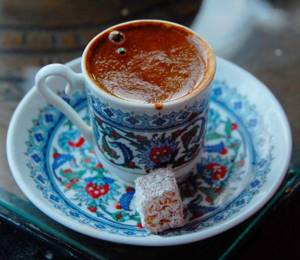
The country's climate is not suitable for growing coffee plants. Despite this, there is a wide range of coffee on supermarket shelves. There are various types on sale, but coffee beans remain the favorite.
| brand | description |
| Kurukahveci Mehmet Efendi | The company began operating in the 19th century. Now the factories use the latest developments and technologies. Many years of production experience are also taken into account. Mehmet Efendi produces products from finely ground beans, which produce strong aromatic coffee. A package weighing 100 g will cost 5-6 liras (or 55-65 rubles). |
| Hisar Kahve 1928 | The corporation, founded in the first half of the 20th century, produces coffee products using modern equipment. The use of the latest technological developments in production, combined with the experience accumulated over a century of operation of the company, helps to produce high-quality products. The price of the product (per 100 g) is 5-7 liras. This is 55-78 rubles. |
| Cezbeli Kahve | The company is based in Istanbul. Produces instant coffee. Selected Arabica beans are used for production. A package weighing 100 g costs 5 liras (55-58 Russian rubles). |
| Kahve Dunya Türk Kahvesi | A manufacturer operating in the Turkish coffee market since 2004. It supplies ground and instant coffee to stores across the country, and also exports goods to foreign countries (Kuwait, Saudi Arabia, Romania). 100 g of raw materials costs from 5 to 7 liras (from 55 to 78 rubles). |
| Ulker Cafe Grown | The Ülker company, traditionally engaged in the production of chocolate products, produces different types of instant coffee:
The cost is 50 kurus per bag (portioned). Translated into Russian money, this is 5-6 rubles. |
| Nurettin Kocatepe Türk Kahvesi | The Kocatepe company began operations in 1948. The company produces coffee beans. The raw materials are characterized by a high degree of roasting. However, this does not affect the taste of the finished drink, which remains soft, without the slightest sign of bitterness. 100 g of raw materials costs 6-7 Turkish liras (66-78 rubles). |
Have you been to Turkey and only tried Turkish coffee ( Türk kahvesi) ? Didn’t know about the existence of Menengiç kahvesi , Dibek coffee (D ibek kahvesinin) and Osman coffee ( Osmanlı kahvesi) ? Then you urgently need to read this article, take notes in your notebook, and then buy a ticket to the best country of diversity - Turkey! There's always something to taste there!
Every year, millions of tourists visit Turkey, not only to relax on the beach, but also to explore, get to know and see new cities, traditions, and life. For the most part, to satisfy their “tourist hunger,” people buy a ticket, board a plane and eagerly wait to land in old Constantinople (Istanbul). The city is unique in all its forms and meanings, however, if you are seeking to understand the culture of a given country, then it would probably be best to go to a non-tourist place (city), which is usually located far from all world airports (for example, Antalya or Istanbul ) and you can hardly find information about them on the Internet. In this blog, I try to reveal Turkey for you from all sides, whether it is tourism, history, culture or anything else. The most attractive and authentic places are located in the South-East of Turkey, in cities such as Diyarbakir, Mardin, Sanliurfa, Adiyaman, Gaziantep and others. Why am I writing this way? Because, firstly, the cities are NOT touristic, if there is tourism here, it is internal, and secondly, the cities still have ancient buildings and an atmosphere that will immerse you in a fairy tale or a movie. In these cities, people still live in step with the traditions and foundations of their ancestors. That is why it is worth coming to these cities if your goal is to understand the culture of the country. We talk about these cities and other non-tourist places in Turkey (I share with you) in the “OTHER TURKEY” section of this blog.
As for coffee lovers and Turkish various offers on this topic, Turkey, as always, surprises and perfectly charges with its mood. Of course, if your path falls on Istanbul, then one of the first things you will try is Turkish coffee and baklava. All the covers of magazines about Turkey, all websites on the Internet, every Instagram page (dedicated to Turkey) write about this. In general, while you are still sitting in your city, preparing for your trip to Turkey, you are getting your fill of Turkish coffee, simply thanks to its prevalence on the Internet. But that's not what we're talking about. I would like to share with you other interesting types of Turkish coffee or coffee that is popular in Turkey, notably in the Southeast. Of course, it’s best for you to go there to taste it, but in Istanbul you can easily find these types of coffee in almost all restaurants and shops. They are also drunk from a small mug and served with something sweet.
I will again share this information with you in the form of a list, and then you can see according to your taste!
TYPES OF TURKISH COFFEE:
- Turkish coffee ( Türk kahvesi). I couldn’t help but mention this popular type of coffee in Turkey, because it is the highlight of the country, the tradition of the country. Turkish coffee is known to many both by name and taste. But, I want to remind you or disclose it for those who may not be aware. Turkish coffee is coffee prepared by boiling ground beans in a Turkish coffee pot. In the modern world there are also electronic Turks that double the speed of making coffee, but the old and proven method is best. Also, Turkish coffee is a very important part of the tradition of “kız sormaya” (that is, “asking the girl”), which means after a man has decided to marry a girl and proposed to her, his family (parents and all elders) must go to home to a girl who will DEFINITELY prepare Turkish coffee. That is, it is not just a drink, but a very important traditional drink. Just as the Turks cannot have a conversation without tea, so too without Turkish coffee. It is noteworthy that it has the same effect as espresso, but in itself is not as harsh. It can be sweet (şekerli), semi-sweet (orta şekerli) or regular (sade), it all depends on your taste.
- Menengic coffee ( Menengiç kahvesi) is also one of the varieties of Turkish coffee, but it will be relevant for those who usually drink coffee with milk. No, don't think about it, milk is not added here. Coffee is made from the special menenchiga fruit (green balls). The fruits are ground and a defect is obtained, which is then brewed in a Turkish coffee pot, similar to Turkish coffee. The beans themselves taste very soft and light, so it gives the impression that you are drinking Turkish coffee with milk.
- Osmanli coffee ( Osmanlı kahvesi) is also one of the common and famous types of Turkish coffee. It differs from the previous two only in that it is prepared on the basis of ground coffee beans with the addition of spices and rights. This type of coffee is ideal for the atmosphere of a colorful city. For example, in Istanbul, free tastings of Ottoman coffee are often held in bazaars. Why? The smell attracts people's attention, and this unique and colorful taste forces you to buy several packs so that in cloudy weather, brew yourself warm Ottoman coffee, pick up a book and sit against the window, enjoying life. What could be better than the invigorating and unique taste of Ottoman coffee in cloudy and sad weather?
- Dibek coffee (D ibek kahvesi) is one of the most favorite types of coffee. As my Turkish friend said: “Dibek coffee is something between Meningich coffee and Osmanli coffee and Turkish coffee.” I roughly imagined the taste, or rather tried to imagine it. But you won’t know until you try, so I agreed to her offer to drink a cup of Dibek coffee. And it was the best thing I tried while living in Turkey. Many people say that dibek is not a type of coffee, but only a type of grinding. Even if this is the case, then all the same, Dibek can be distinguished as a separate type of Turkish coffee, since here in restaurants and shops this name appears and gains popularity. It is believed that this type of coffee is quite mild and each coffee shop adds its own additional ingredients. Therefore, we can call Dibek Coffee - smashed coffee or surprise coffee. However, it is recommended for tasting.
- Kul coffee “ Kül kahvesi” is the same as Turkish coffee, the only difference is in the preparation method, which changes the taste of the coffee itself. Ground Turkish coffee is prepared in a Turk, but always on a grill, which is why the name Kül coffee comes from, which in Turkish means “Ash”, that is, literally: “Ash coffee”, but it would sound more like “Specialized coffee, cooked on coals."
This is where our list ends, I hope you now have a sense for new trips to Turkey.
On a note, I also want to provide you with a small list of good and high-quality brands that produce Turkish coffee, which will be useful for you when buying coffee to take with you to your homeland.
- Kurukahveci Mehmet Efendi Türk Kahvesi is one of the most popular and trusted brands of Turkish coffee. The majority of the country's population (Turks) prefer this brand. After all, already in 1871, Mehmed Efendi (whose name the coffee brand bears) first began selling ground coffee beans, which began to cause the popularity and development of this person as a brand.
- Kahve Dünyası Türk Kahvesi is the second popular brand of Turkish coffee, which is remarkably used in restaurants. If you look at it objectively, the price is an order of magnitude higher than the previous brand.
- Hisar Kahve 1928 is one of the brands of Turkish coffee that has recently begun to gain popularity, thanks to its appearance in chain stores, for example A101 and the like. The price is standard.
- Nurettin Kocatepe Türk Kahvesi - just like the second brand, it is a fairly popular brand, used in restaurants and demonstrating itself on the shelves of chain stores. This brand, in addition to Turkish coffee, also produces salep - a milk drink with cinnamon, ideal for warming in cold weather.
- Yemenli Turk Kahvesi - you can remarkably find this brand in the Şok supermarket, ideal for those who, for example, do not like pieces of ground beans in their cup, but love the taste of Turkish coffee. You buy a moka pot and this brand is ideal for this type of use, as well as for the usual, familiar preparation of Turkish coffee.
- OSSO is an ideal and proven brand of Ottoman coffee, Minengic and Dibek coffee. Note: it is best to buy these brands in supermarkets, as prices at bazaars are twice as high.
62
Topic for tourists to note Gastronomic tourism Interesting facts about different countries Culture and traditions of countries Life hacks for traveling
Countries Russia Türkiye
Turkish coffee beans: which one is better?

Turkish manufacturing enterprises supply the local market with a wide range of products containing Robusta or Arabica beans. Arabica is in greatest demand in Turkey. It is believed that a drink made from Arabica beans tastes better and also has a brighter aroma.
When purchasing products, you need to pay attention to the labels on the packaging. The percentage of raw material quality (100% Arabica) must be indicated there. According to the Turks, only from such a product can a real aromatic “elixir” be prepared.
The country of origin of the grains is also important. Products grown in Brazil are in demand. In addition, such products have a relatively low cost.
What is the best ground coffee in Turkey?
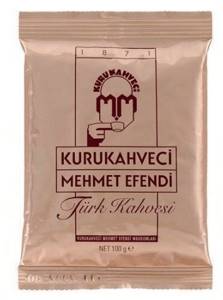
Modern Turks often buy freeze-dried coffee. Despite this, ground coffee ranks first in the list of sales leaders.
Brands sold include:
- Kurukahveci Mehmet Efendi;
- Abdullah Efendi Türk Kahvesi;
- Orta Kavrulmuş Türk Kahvesi.
“Mehmet Efendi” is in first place in sales. This product is purchased by Turks to prepare treats at home. Tourists do not ignore the popular brand either, purchasing the product and bringing it back home as a souvenir.











